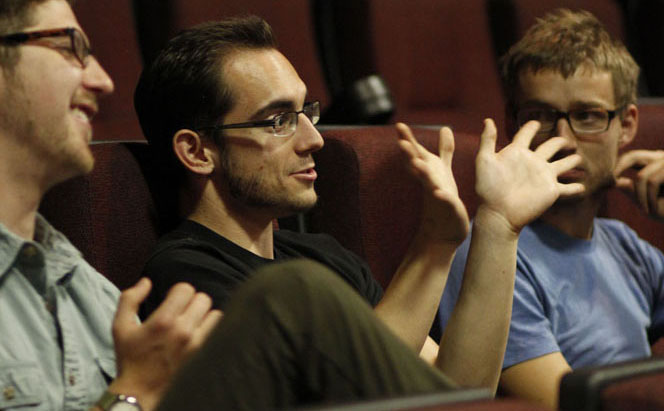Identifying yourself as a teacher of philosophy can be “a conversation stopper,” says Andrea Houchard, who knows the feeling of not being taken seriously. Yet her conviction that philosophy is accessible to the community has helped turn the discipline into a conversation starter.
“Philosophy is really just a way to help us understand ourselves, each other and the world, and how to make good decisions,” said Houchard, director of the Philosophy in the Public Interest program at Northern Arizona University. “That sounds really simple but it is actually one of the greatest challenges we face as human beings.”
Through the program, Houchard and her colleagues are bringing a practical application of philosophy to public discussions on a wide range of issues. What began in fall 2011 as a spontaneous idea has grown into a series of public forums, salon discussions and high school outreach programs with an influence extending well beyond Flagstaff.
Success has even brought national recognition. The American Philosophical Association and the Philosophy Documentation Center have selected the program as the winner of the 2013 APA/PDC prize for excellence and innovation in philosophy programs.
“The award definitely enhances the credibility and legitimacy of what we’re doing as a philosophical activity,” Houchard said. “Our program is not what is characteristically done by professional academic philosophers, yet now it’s been recognized by them.”
Although a philosophy instructor by profession, Houchard points to her prior work in nonprofits and community-based organizations as the influences that drew her toward a public approach.
“I appreciate academic philosophy, but I thought philosophy has the potential to enrich every person’s life—not just those who study it in a university,” Houchard said.
Hot Topics Café, the signature component of Philosophy in the Public Interest, is now in its third year, inspired by the fundamental understanding that “we do better when we work with each other and share our ideas,” Houchard said.
Stressing a role as “neutral convener,” Houchard said the café format is not a debate. “We’re not trying to declare a winner or a best position. We’re just trying to help people understand the reasoning behind different points of view.”
Each café forum identifies a single topic—recently, for example, water conservation and catchment—that is covered in an overview by a philosopher facilitator. A few questions are offered to focus the discussion and an informational handout offers basic facts about the topic. From there, the dynamic is fed by an exchange of viewpoints among participants.
From seven sessions on campus the first year, Hot Topics Café has grown to more than 20 gatherings on campus and around Flagstaff and Sedona. Houchard attributes some of that popularity to the humanizing effect of a face-to-face exchange of views instead of the more prevalent and impersonal—and often confrontational—interactions that take place online.
“We get letters from people thanking us for the opportunity to think through these issues carefully with others,” Houchard said.
Other components of Philosophy in the Public Interest include Sedona Salons—addressing issues of general interest such as friendship, happiness, death, civic life and geologic time—and Philosophy in the Schools, which delivers an environmental outreach program to high schools.
In addition, a new eight-week moral courage program just concluded at Ponderosa High School. The program emphasizes “thinking about how to make good choices in your everyday life,” Houchard said. The students found the discussions so valuable they now want to start their own program and offer it to middle school students, she said.
Even with all the success of Philosophy in the Public Interest, “there have been lots of tweaks and we’re still tweaking,” Houchard said. “We’re definitely learning all the time.”
Such an approach reflects the underlying motivation of the program.
“There aren’t final answers to moral and political questions,” Houchard said. “They are perennial questions, and that’s why we have to come back to them over and again.”



